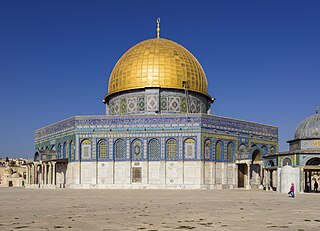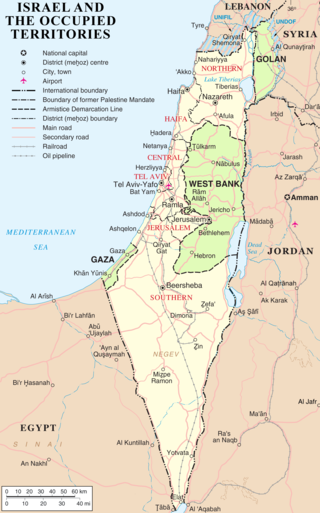Related Research Articles

The Palestine Liberation Organization is a Palestinian nationalist coalition that is internationally recognized as the official representative of the Palestinian people. Founded in 1964, it initially sought to establish an Arab state over the entire territory of the former Mandatory Palestine, advocating the elimination of the State of Israel. However, in 1993, the PLO recognized Israeli sovereignty with the Oslo I Accord, and now only seeks Arab statehood in the Palestinian territories that have been militarily occupied by Israel since the 1967 Arab–Israeli War.
Land for peace is a legalistic interpretation of UN Security Council Resolution 242 which has been used as the basis of subsequent Arab-Israeli peace making. The name Land for Peace is derived from the wording of the resolution's first operative paragraph which affirms that peace should include the application of two principles: Withdrawal of Israeli forces, and Termination of all claims or states of belligerency. Since the resolution stipulates that both principles should apply, they can be viewed jointly as giving up land for peace, referred to more concisely as 'land for peace'.

The history of the State of Palestine describes the creation and evolution of the State of Palestine in the West Bank and Gaza Strip.

The Palestinian territories are the two regions of the former British Mandate for Palestine that have been occupied by Israel since the Six-Day War of 1967, namely the West Bank and the Gaza Strip. The International Court of Justice (ICJ) has referred to the West Bank, including East Jerusalem, as "the Occupied Palestinian Territory", and this term was used as the legal definition by the ICJ in its advisory opinion of July 2004. The term occupied Palestinian territory was used by the United Nations and other international organizations between October 1999 and December 2012 to refer to areas controlled by the Palestinian National Authority, but from 2012, when Palestine was admitted as one of its non-member observer states, the United Nations started using exclusively the name State of Palestine. The European Union (EU) also uses the term "occupied Palestinian territory". The government of Israel and its supporters use the label "disputed territories" instead.

The Camp David Accords were a pair of political agreements signed by Egyptian President Anwar Sadat and Israeli Prime Minister Menachem Begin on 17 September 1978, following twelve days of secret negotiations at Camp David, the country retreat of the President of the United States in Maryland. The two framework agreements were signed at the White House and were witnessed by President Jimmy Carter. The second of these frameworks led directly to the 1979 Egypt–Israel peace treaty. Due to the agreement, Sadat and Begin received the shared 1978 Nobel Peace Prize. The first framework, which dealt with the Palestinian territories, was written without participation of the Palestinians and was condemned by the United Nations.

The Israel–Jordan peace treaty, sometimes referred to as the Wadi Araba Treaty, is an agreement that ended the state of war that has existed between the two countries since the 1948 Arab–Israeli War and established mutual diplomatic relations. In addition to establishing peace between the two countries, the treaty also settled land and water disputes, provided for broad cooperation in tourism and trade, and obligated both countries to prevent their territory being used as a staging ground for military strikes by a third country.
The Beirut Summit was a meeting of the Arab League in Beirut, Lebanon, in March 2002 to discuss the Israeli–Palestinian conflict. At the time Yasser Arafat, the Leader of Palestine, was under house-arrest in his Ramallah compound. The Israeli forces confined him and prevented him from attending the Beirut Summit.

The Geneva Initiative, also known as the Geneva Accord, is a draft Permanent Status Agreement to end the Israeli–Palestinian conflict, based on previous official negotiations, international resolutions, the Quartet Roadmap, the Clinton Parameters, and the Arab Peace Initiative. The document was finished on 12 October 2003.

Intermittent discussions are held by various parties and proposals put forward in an attempt to resolve the ongoing Israeli–Palestinian conflict through a peace process. Since the 1970s, there has been a parallel effort made to find terms upon which peace can be agreed to in both the Arab–Israeli conflict and in the Palestinian–Israeli conflict. Notably the Camp David Accords between Egypt and Israel, which included discussions on plans for "Palestinian autonomy", but did not include any Palestinian representatives. The autonomy plan would not be implemented, but its stipulations would to a large extent be represented in the Oslo Accords.
The Madrid peace conference letter of invitation, also known as the Madrid Invitation or Letter of invitation to the Middle East Peace Conference in Madrid, of October 19, 1991, was a formal diplomatic invitation by the United States and the Soviet Union issued to Israel, Syria, Lebanon, Jordan and the Palestinians, calling on them to come together and hold a peace conference in Madrid, Spain. The resulting conference came to be known as the Madrid Conference that commenced on October 30, 1991.
The Arab–Israeli conflict began in the 20th century, evolving from earlier Intercommunal violence in Mandatory Palestine. The conflict became a major international issue with the birth of Israel in 1948. The Arab–Israeli conflict has resulted in at least five major wars and a number of minor conflicts. It has also been the source of two major Palestinian uprisings (intifadas).

The Arab Peace Initiative, also known as the Saudi Initiative, is a 10 sentence proposal for an end to the Arab–Israeli conflict that was endorsed by the Arab League in 2002 at the Beirut Summit and re-endorsed at the 2007 and at the 2017 Arab League summits. The initiative offers normalisation of relations by the Arab world with Israel, in return for a full withdrawal by Israel from the occupied territories, with the possibility of comparable and mutual agreed minor swaps of the land between Israel and Palestine, a "just settlement" of the Palestinian refugee problem based on UN Resolution 194, and the establishment of a Palestinian state with East Jerusalem as its capital. A Palestinian attack called the Passover massacre took place on 27 March 2002, the day before the Initiative was published, which initially overshadowed it.

The Arab–Israeli conflict is the phenomenon involving political tension, military conflicts, and other disputes between various Arab countries and Israel, which escalated during the 20th century. The roots of the Arab–Israeli conflict have been attributed to the support by Arab League member countries for the Palestinians, a fellow League member, in the ongoing Israeli–Palestinian conflict; this in turn has been attributed to the simultaneous rise of Zionism and Arab nationalism towards the end of the 19th century, though the two national movements had not clashed until the 1920s.

The modern borders of Israel exist as the result both of past wars and of diplomatic agreements between the State of Israel and its neighbours, as well as an effect of the agreements among colonial powers ruling in the region before Israel's creation. Only two of Israel's five total potential land borders are internationally recognized and uncontested, while the other three remain disputed; the majority of its border disputes are rooted in territorial changes that came about as a result of the 1967 Arab–Israeli War, which saw Israel occupy large swathes of territory from its rivals. Israel's two formally recognized and confirmed borders exist with Egypt and Jordan since the 1979 Egypt–Israel peace treaty and the 1994 Israel–Jordan peace treaty, while its borders with Syria, Lebanon and the Palestinian territories remain internationally defined as contested.

The 2007 Arab League Summit, also called the 2007 Riyadh Summit, refers to a convention of leaders from 21 members of the Arab League who gathered in Riyadh for the 19th Arab summit in March 2007. The summit convened on the 28 March 2007 and was preceded by a set of preparatory meetings starting on 24 March 2007. United Nations Secretary General Ban Ki-moon and the European Union's foreign policy chief Javier Solana also attended the summit. The main goal of the conference was to re-launch the Arab Peace Initiative.

The Syrian peace process is the ensemble of initiatives and plans to resolve the Syrian civil war, which has been ongoing in Syria since 2011 and has spilled beyond its borders. The peace process has been moderated by the Arab League, the UN Special Envoy on Syria, Russia and Western powers. The negotiating parties to end the conflict are typically representatives of the Syrian Ba'athist government and Syrian opposition, while the Autonomous Administration of North and East Syria is usually excluded at the insistence of Turkey. Radical Salafist forces including the Islamic State of Iraq and the Levant have not engaged in any contacts on peaceful resolution to the conflict.

The U.S.–Russia peace proposals on Syria refers to several American–Russian initiatives, including joint United States–Russia proposal issued in May 2013 to organize a conference for obtaining a political solution to the Syrian Civil War. The conference was eventually mediated by Lakhdar Brahimi, the United Nations peace envoy for Syria.

The Geneva II Conference on Syria was a United Nations-backed international peace conference on the future of Syria with the aim of ending the Syrian Civil War, by bringing together the Syrian government and the Syrian opposition to discuss the clear steps towards a transitional government for Syria with full executive powers. The conference took place on 22 January 2014 in Montreux, on 23–31 January 2014 in Geneva (Switzerland), and again on 10–15 February 2014.
Arab–Israeli relations refers to relations between Israel and Arab nations. Israel's relations with the Arab world are overshadowed by the Arab–Israeli conflict and the Israeli–Palestinian conflict. Israel has been at war with Arab states on several occasions. Furthermore, a large majority of states within the Arab League do not recognize Israel, and Israelis and Jews in general are considered a frequent target of antisemitism in the Arab world. Antisemitism is considered an integral part of everyday culture in many Arab countries. After several Arab-Israeli wars, Egypt was the first Arab state to recognize Israel diplomatically in 1979 with the signing of the Israel-Egypt Peace Treaty. It was followed by Jordan with the Israel-Jordan Peace Treaty (1994). In 2020, four more Arab states normalized relations. There have also been talks of an emerging Arab–Israeli alliance against Iran.
References
- ↑ Gary Sick, Special to. "Mideast peace starts with talking to Iran". CNN.